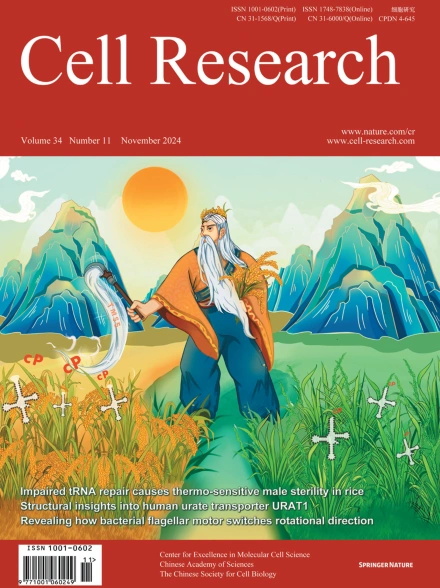
Advanced Search
Submit Manuscript
Advanced Search
Submit Manuscript
Volume 34, No 11, Nov 2024
ISSN: 1001-0602
EISSN: 1748-7838 2018
impact factor 17.848*
(Clarivate Analytics, 2019)
Volume 34 Issue 11, November 2024: 763-775
Impaired 2′,3′-cyclic phosphate tRNA repair causes thermo-sensitive genic male sterility in rice
Bin Yan1,† , Chunyan Liu1,†,* , Jing Sun1,2,3,† , Yang Mao2,3,† , Can Zhou1,4,† , Ji Li1,4 , Wei Liu1 , Shengdong Li1,4 , Wei Yan5 , Chenjian Fu6 , Peng Qin6 , Xingxue Fu6 , Xinghui Zhao6 , Xianwei Song7 , Jiawei Nie2,3,4 , Feng Gao2,3 , Yuanzhu Yang6,8,9,* , Yuhang Chen2,3,4,* , Xiaofeng Cao1,4,*
1Institute of Genetics and Developmental Biology, Chinese Academy of Sciences, Beijing, ChinaHybrid rice, widely planted in Asia, is pathogen resistant and has superior yields, making it a major contributor to global food security. The two-line hybrid rice system, which utilizes mutants exhibiting photo-/thermo-sensitive genic male sterility (P/TGMS), is the leading hybrid rice breeding technology. Mutations in THERMO-SENSITIVE GENIC MALE STERILE 5 (TMS5) accounts for over 95% of current TGMS lines. We previously found that tms5 carries a mutation in ribonuclease ZS1. Despite its importance for breeding robust rice lines, the mechanism underlying tms5-mediated TGMS remains elusive. Here, we demonstrate that TMS5 is a tRNA 2′,3′-cyclic phosphatase. The tms5 mutation leads to accumulation of 2′,3′-cyclic phosphate (cP)-ΔCCA-tRNAs (tRNAs without 3′ CCA ended with cP), which is exacerbated by high temperatures, and reduction in the abundance of mature tRNAs, particularly alanine tRNAs (tRNA-Alas). Overexpression of tRNA-Alas in the tms5 mutant restores male fertility to 70%. Remarkably, male fertility of tms5 mutant is completely restored at high temperatures by knocking out OsVms1 which encodes the enzyme for cP-ΔCCA-tRNA generation. Our study reveals the mechanism underlying tms5-mediated TGMS in rice and provides mechanistic insight into the further improvement of TGMS in hybrid crop development.
https://doi.org/10.1038/s41422-024-01012-4